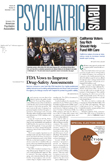The two psychiatric illnesses most implicated in violent behavior are schizophrenia and antisocial personality disorder. But how does the cognition of persons who have schizophrenia and who are violent compare with that of violent antisocial individuals?
A new study out of the United Kingdom and in press with Schizophrenia Research offers some tentative answers. The study was headed by Ian Barkataki, Ph.D., of the Institute of Psychiatry in London. One of the study collaborators was Pamela Taylor, M.D., a professor of forensic psychiatry at the University of Cardiff.
The study found that when certain cognitive functions in individuals with schizophrenia who have been violent are compared with the same cognitive functions in mentally healthy persons, the former are markedly worse. In contrast, the same cognitive functions in violent antisocial individuals appear to be close to those of mentally healthy persons.
Some studies have focused on either the cognitive performance of persons with schizophrenia who have been violent or on the cognitive performance of individuals with antisocial personalities, but none has compared the performance of both groups.
The study conducted by Barkataki and his group included 57 subjects—14 with a DSM-IV diagnosis of antisocial personality disorder and a history of violence, 13 with a DSM-IV diagnosis of schizophrenia and a history of violence, 15 with a DSM-IV diagnosis of schizophrenia without a history of violent behavior, and 15 control subjects with no previous psychiatric diagnoses and with no history of violence. All four groups were matched according to age, ethnicity, socioeconomic background, and number of years of education.
The subjects were then given a battery of tests to measure five cognitive functions: general intellectual function, executive function, attention, verbal memory, and information-processing speed.
There was no significant difference between the nonviolent and violent schizophrenia subjects on any of the measures tested except for executive function, where the violent subjects performed more poorly. Both violent and nonviolent schizophrenia subjects demonstrated significant deficits in all five domains tested compared with control subjects. Violent antisocial subjects performed as well as control subjects on all measures except information-processing speed, where they did significantly worse.
These findings have some implications for persons with antisocial personalities, the researchers believe. For instance, if the executive function of violent antisocial individuals is not impaired, then a prefrontal cortex dysfunction is probably not a core feature of the antisocial personality, as some brain metabolism studies and gray matter volume studies have suggested (Psychiatric News, March 3, 2000; April 5, 2002). Further, if violent antisocial persons truly process information at a sluggish rate, then the impulsive and risk-taking traits of antisocial individuals may be linked to a failure to process, in adequate time, data indicating peril. Their tardy information-processing might likewise prevent them from adequately judging social situations. For example, violent antisocial persons might fail to realize that “some remark had been made in jest,” Taylor told Psychiatric News. “They would take it only at face value, be deeply offended, and often react aggressively.”
Whether the findings have any implications for individuals with schizophrenia, however, appears less certain. Nonetheless, Paul J. Fink, M.D., a former APA president, speculates that if cognitive testing of persons with schizophrenia were to reach a level of sophistication where it could“ carefully delineate those who are violent from those who are not violent,” it might help combat the public's frequent, and erroneous, conviction that all persons with schizophrenia are dangerous.
The study was funded by the Community Fund, the Stanley Medical Research Institute, the Wellcome Trust, and the Zito Trust.
An abstract of the study, “A Neuropsychological Investigation Into Violence and Mental Illness,” is posted online at<www.sciencedirect.com>; click “Browse A-Z of journals,” then “S,” then“ Schizophrenia Research.” ▪
